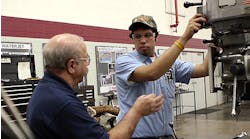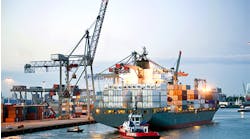I am a proponent of free markets and free trade, so words like ‘protectionism’ and ‘tariff’ always induce in me a shudder of resistance. By the same token, I am practical enough to realize there are times when political or economic expedience override good sense when government formulates trade policy. At the very least, let’s just say that protectionist economic policies should be used, if ever, as a measure of last resort, and then only for very limited periods.
That having been said, I think the steel industry has had far more than its share of protectionism through the decades. All that basic steel has to show for round after round of protectionist policies dating back to the Johnson administration are extraordinarily large legacy costs (negotiated while under protection), reduced industry capacity, and the yammering for more protection.
On March 20, 2002, tariffs of up to 30 percent on imported steel imposed by the Bush administration took effect. The tariffs were cheered by steelmakers, and political points were scored in steel producing regions before last year’s mid-term elections. When the tariffs were imposed, the administration was careful to state they were part of a larger goal to restructure the industry and restore global balance to it.
Relative to the tariffs, if you make steel you like them, but if you consume steel your material costs have increased. The tariffs have made steel mills busier and put steel producers on a better economic footing. However, industries that use steel in this country far outweigh the one that makes it in economic importance, and workers in key steel consuming industries outnumber steelworkers 40 to 1. As an economic decision, the tariffs harmed more people and businesses than they have helped.
In March of this year, the World Trade Organization ruled the current steel tariffs to be illegal in response to an action filed by the European Union. This “interim” decision was confirmed a month later by a three-person WTO panel because, analysts claim, the tariffs were imposed at a time when steel imports to this country were declining.
It makes no particular difference to me that WTO thinks the tariffs illegal, except that it exposes the U.S. to more accusations of unilateralism among the community of nations. But protectionism has its political and economic complexities. One of those is retribution. This usually involves the use of similar tactics, though not always in the same industry. This is illustrated by the retributory tariffs the Chinese have applied to some imported textiles in recent weeks.
Don’t get me wrong. Although I am against protectionism, I am also mindful that steelmaking is an industry vital to the security and interests of the U.S. I am sensitive to the fact that 50,000 steelworkers lost their jobs since 1997, and that one-third of our steelmaking capacity is operating in bankruptcy. However, having shed its weaker players, the industry is consolidating itself into a stronger base, more equitable labor contracts have been negotiated, and some of the work done by tariffs has been inadvertently been accomplished by a weakened U.S. dollar since the tariffs took effect.
In light of the WTO decision, President Bush has tough choices to make that could have economic and political impact on next year’s election. Steel producers have had a break, but now it’s time for them to get back on their own feet, and it’s time for the tariffs to be rescinded.








